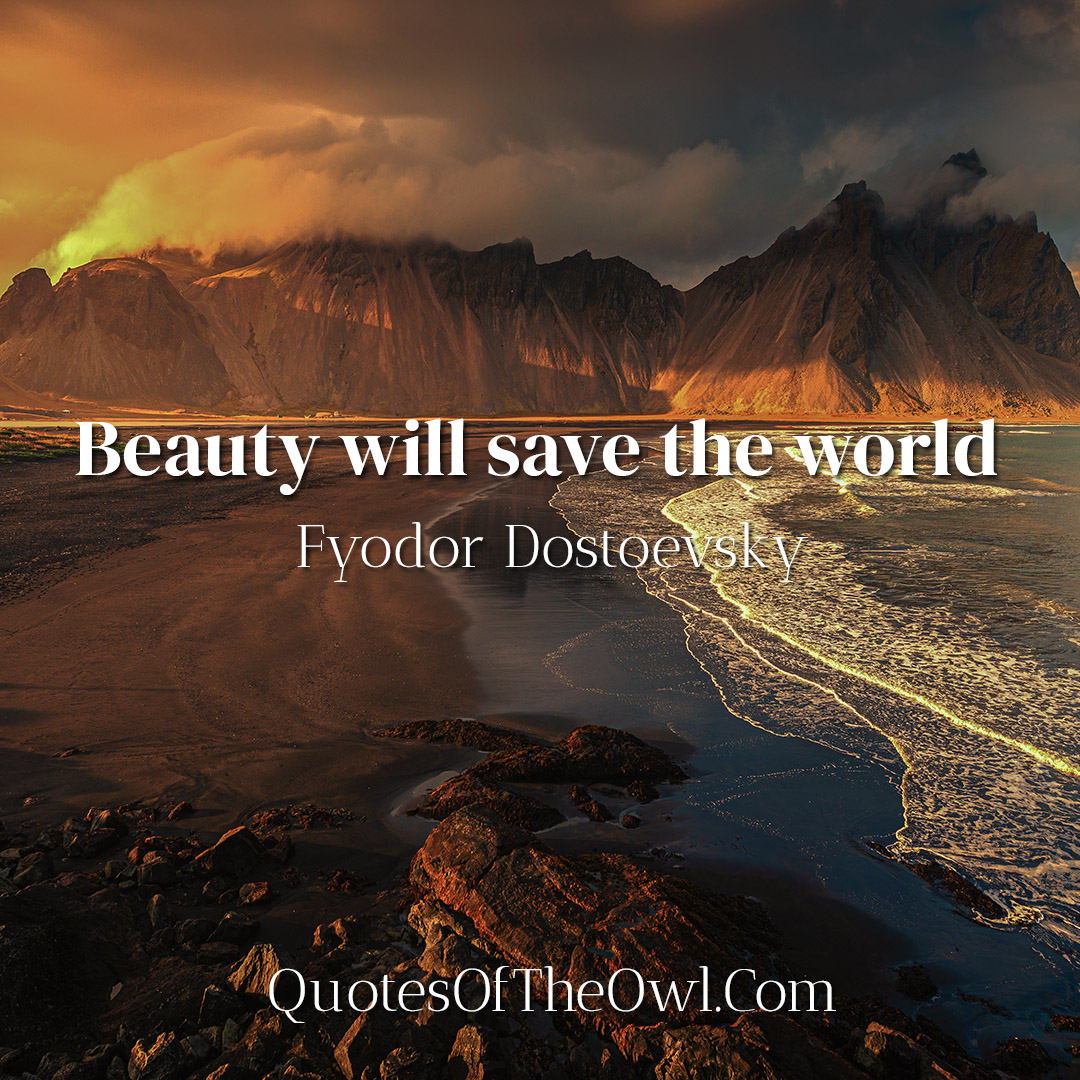What is the Meaning of Fyodor Dostoevsky’s Quote: “Beauty will save the world”?
In the realm of literature and philosophical musings, Fyodor Dostoevsky, the renowned Russian author, left behind a powerful quote that has captivated readers and thinkers for generations. The quote, “Beauty will save the world,” holds deep meaning and invites us to explore the profound implications it carries. This article aims to unravel the essence of this enigmatic statement, delving into its various interpretations and shedding light on its significance.
The Context of Fyodor Dostoevsky’s Quote
Fyodor Dostoevsky, known for his profound and introspective writings, included the quote “Beauty will save the world” in his novel “The Idiot“. The novel explores the complexities of human nature and the contrast between the inherent beauty of the protagonist’s soul and the corrupted world surrounding him. Within this context, the quote becomes a beacon of hope, suggesting that beauty possesses the potential to bring salvation and transform the world.
The Interpretations of Beauty
Beauty as Aesthetic Pleasure
One interpretation of Dostoevsky’s quote focuses on beauty as a source of aesthetic pleasure. In this view, beauty, whether found in nature, art, or human actions, has the power to evoke deep emotional responses. It transcends the mundane and touches the core of our being, lifting our spirits and reminding us of the inherent goodness and harmony in the world.
Beauty as Moral Transformation
Another interpretation sees beauty as a catalyst for moral transformation. According to this perspective, experiencing beauty awakens our inner virtues and inspires us to pursue higher ideals. The encounter with beauty prompts introspection and encourages us to align our actions with principles such as compassion, empathy, and justice.
Beauty as Redemption
A more profound interpretation suggests that beauty serves as a means of redemption. It implies that the transformative power of beauty can restore individuals and societies, healing the wounds inflicted by the darkness and suffering that often pervade the world. Beauty, in this sense, becomes a force that leads to salvation and renewal.
Beauty and its Relationship with the World
Dostoevsky’s quote hints at the interconnectedness between beauty and the world. It suggests that the world, with its struggles and imperfections, can find solace and redemption through encounters with beauty. By appreciating and nurturing beauty, we become agents of change, fostering harmony and inspiring others to embrace a more profound understanding of life.
Beauty’s Power to Inspire Change
Individual Transformation
Beauty has the power to transform individuals from within. When we encounter something truly beautiful, whether it’s a captivating piece of art, a breathtaking landscape, or an act of kindness, it can deeply touch our souls. These experiences have the potential to awaken dormant aspirations, reshape our perspectives, and drive us towards personal growth and self-improvement.
Societal Transformation
Furthermore, beauty can catalyze societal transformation. Throughout history, art, literature, and music have sparked revolutions, challenged societal norms, and fostered cultural progress. By appealing to the universal sense of beauty, creators can inspire collective action and ignite movements that bring positive change to the world.
The Role of Art in Manifesting Beauty
Art plays a pivotal role in manifesting beauty and conveying its transformative power. Whether through paintings, sculptures, literature, or music, artists capture the essence of beauty and offer it to the world. Through their creations, they provoke emotions, encourage introspection, and challenge conventional wisdom. Moreover, all these efforts are in service of revealing the profound truths and the redemptive potential of beauty.
Challenges and Critiques
Despite the profound message conveyed by Dostoevsky’s quote, it also faces challenges and critiques. Skeptics argue that beauty alone cannot solve the complex problems and conflicts of the world. They contend that practical actions, grounded in ethics and reason, are necessary to effect lasting change. However, proponents of Dostoevsky’s view assert that beauty serves as a catalyst, inspiring and nurturing the virtues needed to navigate the challenges we face.
The Timelessness of Dostoevsky’s Quote
Dostoevsky’s quote continues to resonate across time and cultures because it taps into the universal longing for meaning and redemption. It reminds us that amidst the chaos and suffering in the world, beauty holds the power to inspire, transform, and save. Regardless of its various interpretations, the essence of the quote lies in its capacity to evoke a deep sense of hope and a call to action.
Conclusion
Fyodor Dostoevsky’s quote, “Beauty will save the world,” encapsulates a profound truth that transcends time and space. It invites us to recognize the transformative power of beauty in our lives and in the world around us. Whether through aesthetic pleasure, moral transformation, or societal change, beauty has the capacity to elevate our existence and bring about redemption. Let us embrace and nurture beauty in all its forms, knowing that by doing so, we become active participants in the salvation of the world.
Dive into Fyodor Dostoevsky’s profound quotes, exploring the depths of human existence

